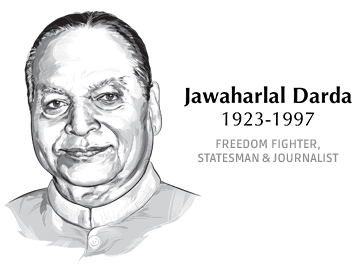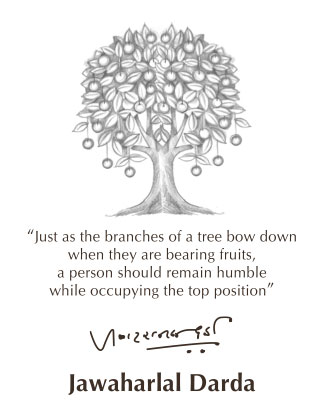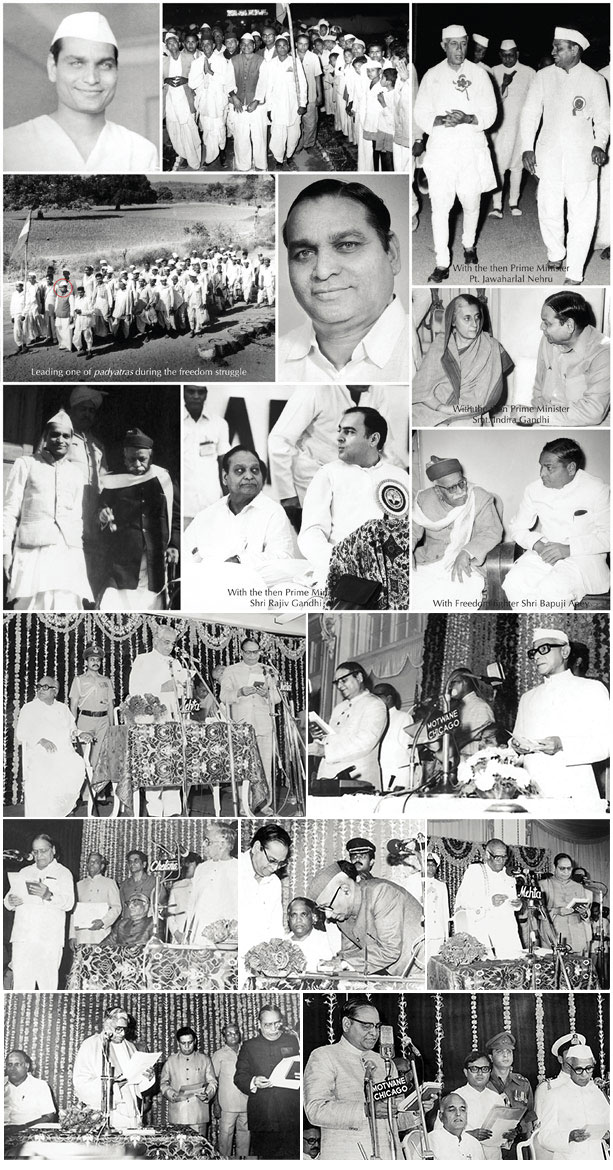

Shri Jawaharlal Amolakchand Darda (“Babuji”) was an Indian freedom fighter, a staunch Gandhian and a torch-bearer of social transformation, who laid down the standards of modern and people-oriented journalism in Maharashtra. He was also a statesman par excellence who left an indelible impression on the society through his involvement in politics and governance. Babuji was born in Babhulgaon village of Yavatmal district (Maharashtra state) on July 2, 1923. With Mahatma Gandhi’s permission, he plunged into the freedom struggle at the tender age of 17. He undertook a 400-mile long padyatra to spread the message of patriotism and was imprisoned for one year and nine months due to his participation in the Quit India movement. While in the jail, he organised meetings of the inmates to strengthen their resolve to achieve the national goal. In 1944, he established the Yavatmal unit of Azad Hind Sena (Indian National Army). He performed admirably as the President of the Yavatmal District Congress Committee from 1944 to 1956. During Acharya Vinoba Bhave’s bhoodan (land donation) movement, he ensured that the largest area of land was donated from the Yavatmal district. In 1947, Babuji launched Nave Jag - a weekly newspaper from Yavatmal to foster the spirit of nationalism. Later, in 1952, he restarted Lokmat, a Marathi weekly, which was later transformed into a daily in 1971 from Nagpur. Due to Babuji’s visionary direction and values, his sons Vijay and Rajendra expanded the Lokmat newspaper to every corner of Maharashtra thus taking the number of its edition to 11 and making it the highest read newspaper of Maharashtra state. Similarly, by launching Lokmat Samachar in Hindi and Lokmat Times in English, Babuji ensured that the same stream of nationalistic ideals reaches out to a larger number of people. Today, the readership of the newspapers of Lokmat group has crossed the 24 million mark, and it is the fifth largest group in the country by the readership metric as far as readership While Babuji let journalism continue his mission forward, he applied himself in the fields of politics and governance. He took a lead in ensuring that as Chairman of Maharashtra Housing Finance Corporation, the housing schemes that were limited to mega cities like Mumbai were taken to smaller villages as well. He later became the Vice President of the International Housing Finance Corporation. He served effectively in various other capacities such as Secretary of Congress party in Yavatmal Municipal Council, Vice President of District Development Board, President of Rashtra Bhasha Prachar Samiti, Yavatmal, Member of Vidya Prasarak Mandal which led to founding of district’s first ever college Amolakchand College, President of Yavatmal District Congress, Director of District Co-operative Bank, Member of Maharashtra State Electricity Board, etc. In 1972, Babuji was nominated to the Maharashtra Legislative Council by the Governor. Subsequently, he went on to get elected to the Council three more times remaining a member till 1995. During this period, he got the opportunity to serve in the state government. As a minister, he left his mark in the history of governance in Maharashtra by his admirable handling of the portfolios of energy, industry, irrigation, health, food and civil supplies, sports, youth affairs, textiles and environment. In 1996, he handled the treasurership of the Congress party. Babuji breathed his last on November 25, 1997 at Mumbai. His final rites were performed opposite his home in Yavatmal (Maharashtra) at a place now known as ‘Prerna sthal’. Babuji was posthumously conferred a ‘Lifetime Achievement Award’ at UK’s House of Commons for his contribution during India’s independence movement and its journey afterwards at the hands of Britain’s minister for energy and business engagement with India Rt. Hon. Gregory Barker and Shadow Foreign Minister with responsibility for India Rt. Hon. Kerry McCarthy on September 12, 2013 at London.  |

|